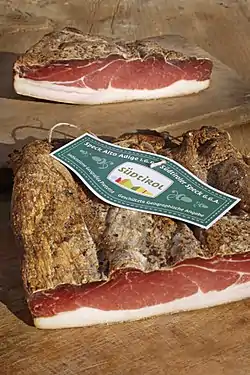
This is a list of notable hams and ham products. Ham is pork that has been preserved through salting, smoking, or wet curing.[1] It was traditionally made only from the hind leg of swine, and referred to that specific cut of pork.[2] Ham is made around the world, including a number of highly coveted regional specialties, such as Westphalian ham and jamón serrano.
Technically a processed meat, "ham" may refer to a product which has been through mechanical reforming. The precise nature of meat termed "ham" is controlled by statute in a number of areas, including the United States and European Union. In addition, numerous ham products have specific geographical indication protection, such as Prosciutto di Parma and Prosciutto Toscano PDO in Europe, and Smithfield ham in the United States.
Hams and ham products
Bulgaria
- Elenski but is a dry-cured ham from the town of Elena in northern Bulgaria and a popular delicacy throughout the country.[3][4] The meat has a specific taste and can be preserved for several years, owing much to the special process of making and the climatic conditions of the part of Stara Planina where Elena is located.
China
- Anfu ham is a dry-cured ham from Anfu, Jiangxi, China, documented starting in the Qin Dynasty.[5] It is eaten alone and also used as an ingredient to add flavor to various dishes.[5]
- Jinhua ham is a type of dry-cured ham named after the city of Jinhua, where it is produced, in the Zhejiang province of eastern China.[5] The ham is used in Chinese cuisine to flavor stewed and braised foods, as well as for making the stocks and broths of many Chinese soups.[4] It is prepared using the Tongcheng pig and has been described as "the most prized ham in all of China".[4]
- Rugao ham is a dry-cured ham that originated in Jiangsu province, China, and was first prepared in 1851.[5][6] Rugao ham is named after Rugao in Jiangsu province and is produced in a diverse variety of flavors, colors, and weights.[5][7]
- Xuanwei ham – a local dish in the Qujing prefecture in Yunnan province, China.[5][8] Xuanwei ham has a 250-year history dating back to 1766. In 1909 it was first mass-produced and gained popularity. It is also used as an ingredient in various dishes.[5]
Czech Republic

- Prague ham is a brine-cured, stewed, and mildly beechwood-smoked boneless ham[9][10][4] originally from Prague in Bohemia (Czech Republic).
England
- York ham originated in Yorkshire, England and is now made in other places. It is a dry-cured ham, but unlike many hams of that sort, is eaten cooked. At its best it is widely considered one of the finest hams.
- Wiltshire cure ham is a historical ham from Wiltshire, England.
- Shropshire Black Ham or Bradenham ham.
France
- Jambon noir de Bigorre (PDO) made from black gascon pigs.
- Jambon de kintoa (PDO) made from basque pigs.
- Jambon de Corse (PDO) made from black nustrale pigs.
- Jambon de Bayonne (PGI) is a cured ham that takes its name from the ancient port city of Bayonne in the far south-west of France, a city located in both the cultural regions of Basque Country and Gascony.[3][4] It has protected geographical indication (PGI) status.
- Jambon d'Auvergne (PGI).
- Jambon de l'Ardèche (PGI).
- Jambon de Lacaune (PGI).
- Jambon de Vendée (PGI).
- Jambon sec des Ardennes (PGI).
- Jambon de Luxeuil.
- Jambon du Limousin made from black cul-noir pigs.
- Jambon de Savoie.
- Jambon du Périgord.
- Jambon des Pyrénées.
- Torchon ham is wrapped in a cloth during cooking, to give it a better flavor and texture.[11]
Germany

- Ammerländer Schinken is a dry-cured (and normally smoked) ham produced in the Ammerland area of northern Germany. It has PGI status under European Union law.[4]
- Black Forest ham is a variety of dry-cured, smoked ham produced in the Black Forest region of Germany.[3][4]
- Westphalian ham is produced from acorn-fed pigs raised in the forests of Westphalia, Germany,[12][13] and the resulting meat is dry-cured and then smoked over a mixture of beechwood and juniper branches.[12][14][15][13][4]
Ireland
- Limerick ham is a method of preparing a joint of ham in the cuisine of Ireland. The method was originally developed in County Limerick, Ireland.
Italy
- Culatello is similar to prosciutto, but is made from the filet or loin of the hind leg; it originated in Parma, Italy.[3]
- Prosciutto is an Italian dry-cured ham that is usually thinly sliced and served uncooked; this style is called prosciutto crudo in Italian (or simply crudo).
- Crudo di Cuneo PDO (Piedmont)
- Prosciutto di Carpegna PDO (Marche)
- Prosciutto di Modena PDO (Emilia-Romagna)
- Prosciutto di Parma PDO (Emilia-Romagna)
- Prosciutto di San Daniele PDO (Friuli-Venezia Giulia)
- Prosciutto toscano PDO (Tuscany)
- Prosciutto Veneto Berico-Euganeo PDO (Veneto)
- Prosciutto amatriciano PGI (Lazio)
- Prosciutto di Norcia PGI (Umbria)
- Prosciutto di Sauris PGI (Friuli-Venezia Giulia)
- Speck Alto Adige PGI is a dry-cured, lightly smoked ham (prosciutto in Italian), produced in South Tyrol, northern Italy. Parts of its production are regulated by the European Union under the PGI status. In Italy and Turkey parts of the English-speaking culinary world, the term "speck" refers to Italian Speck Alto Adige PGI, a type of prosciutto.[16]
- Tyrolean Speck – a distinctively juniper-flavored, boneless ham originally from Tyrol, an historical region that since 1918 partially lies in Italy.[4] The first historical mention of Tyrolean Speck' was in the early 13th century, when some of the current production techniques were already in use.
- Vallée d’Aoste Jambon de Bosses is a spicy, cured ham product from Saint-Rhémy-en-Bosses in the Aosta Valley in Italy,[17] one of the region's specialties.[18][19] It was awarded protected designation of origin (PDO) status by the European Union.[20]
Luxembourg
- Éisleker ham, literally "Oesling ham", is a speciality from the Oesling region in the north of Luxembourg, which is produced from the hind legs of pigs. Traditionally, it was prepared by marinating the hams in herbs and vinegar for several days, then hanging them in a chimney for long periods of cold smoking. Today, the meat is cured in brine for two weeks and placed in a smoker fed from beech and oak chips for about a week.
Montenegro
.jpg.webp)
- Njeguški pršut is a dry-cured ham served uncooked, similar to Italian prosciutto; it is a specialty of Njeguši, a village in Montenegro
Portugal
- Jamón ibérico is produced in Spain and Portugal, from the local breed of acorn-fed pigs.
- Presunto is a dry-cured ham from Portugal, similar to Spanish jamón or Italian prosciutto crudo.
Spain
.jpg.webp)
- Jamón serrano or simply Jamón - A dry-cured ham and one of the most well known foods of Spanish cuisine. It has traditional specialities guaranteed (TSG) status.[4]
- Jamón ibérico – A variety of Jamón produced in Spain and Portugal, made from black Iberian pigs instead of white breeds. It includes the world's most expensive hams.
- Lacón Gallego is a dried ham product from Galicia, with PGI status under European law
United States
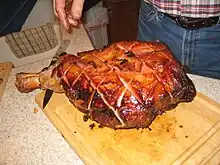
- Chipped chopped ham is a processed ham luncheon meat made from chopped ham. Chopped ham is a mixture of ham chunks and trimmings and seasonings, ground together and then packaged into loaves.
- City ham is the name for a variety of brine-cured hams that are not dry-cured or dried, so must be refrigerated for safe storage. It is known simply as "ham" in regions of the U.S. where country ham is unknown.
- Country ham is a variety of dry-cured ham, referring to a method of curing and smoking done in the parts of the Southeast U.S. states of North Carolina, South Carolina, Tennessee, Virginia, Georgia, Kentucky, Missouri, and other nearby states.[4]
- Glazed ham in the U.S. is coated with a flavored or spiced sugar solution (glazed) ham before cooking.
- Smithfield ham is a specific form of country ham finish-cured in the town of Smithfield in Isle of Wight County in the Hampton Roads region of Virginia, United States.[4]
Wales
- Carmarthen Ham (PGI), an air dried ham cured in the traditional Welsh Farmhouse way.
- Hams and ham products
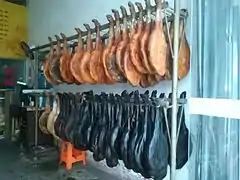
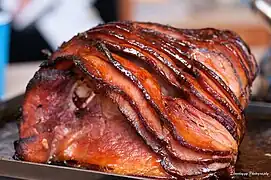 Honey-glazed ham
Honey-glazed ham Sliced jamón ibérico
Sliced jamón ibérico
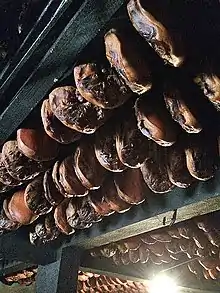 Njeguški pršut being cured with smoke
Njeguški pršut being cured with smoke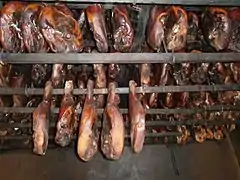 Also Njeguški pršut in a smokehouse
Also Njeguški pršut in a smokehouse Sliced Speck Alto Adige PGI
Sliced Speck Alto Adige PGI Westphalian ham atop bread, with cheese
Westphalian ham atop bread, with cheeseXuanwei_ham.jpg.webp) Xuanwei ham in a butcher shop
Xuanwei ham in a butcher shop
See also
- Ham hock
- Ham sausage
- List of dried foods
- List of ham dishes
- List of pork dishes
- List of smoked foods
- Turkey ham – a processed food made primarily from cooked or cured turkey meat and water, formed into the shape of a ham and often sold pre-sliced.
References
- ↑ "Red and processed meats and cancer prevention". World Cancer Research Fund. 12 August 2014.
- ↑ "Bacon: Bacon and Ham Curing" in Chambers's Encyclopædia. London: George Newnes, 1961, Vol. 2, p. 39.
- 1 2 3 4 DK Publishing (2010). The Illustrated Cook's Book of Ingredients. The Illustrated Cook's Book of Ingredients. Penguin. p. 164. ISBN 978-0-7566-7673-5.
- 1 2 3 4 5 6 7 8 9 10 11 12 Nosowitz, Dan (December 24, 2016). "Check Out These Sick Hams From Around The World". Modern Farmer. Retrieved May 22, 2017.
- 1 2 3 4 5 6 7 Isacs, John H. (January 16, 2014). "How to match dry-cured swine with perfect wine". Shanghai Daily. Retrieved 21 May 2017.
- ↑ Hui, Y.H.; Evranuz, E. Özgül (2016). Handbook of Animal-Based Fermented Food and Beverage Technology, Second Edition. CRCNET books. CRC Press. pp. 656–657. ISBN 978-1-4398-5023-7. Retrieved May 22, 2017.
- ↑ Ang, C.Y.W.; Liu, K.; Huang, Y.W. (1999). Asian Foods: Science and Technology. Taylor & Francis. p. 209. ISBN 978-1-56676-736-1. Retrieved May 22, 2017.
- ↑ "Xuanwei ham". kaleidoscope.cultural-china.com. Retrieved 2016-06-28.
- ↑ Prague Ham
- ↑ "About Prague Ham - and Czech Beer". Archived from the original on 2016-08-10. Retrieved 2017-05-21.
- ↑ "Torchon Ham | Pomona Export". www.pomonaexport.com. Retrieved 2023-04-14.
- 1 2 Hayes, Kevin J. (2008). The Road to Monticello: The Life and Mind of Thomas Jefferson. Oxford University Press. pp. 363. ISBN 978-0199758487.
- 1 2 The Encyclopedia of Healing Foods - Michael T. Murray, Joseph E. Pizzorno. p. 616.
- ↑ Daily Consular and Trade Reports. Department of Commerce and Labor, Bureau of Manufactures (U.S.). 1912. p. 55.
- ↑ Swindled: The Dark History of Food Fraud, from Poisoned Candy to Counterfeit ... - Bee Wilson. p. 11.
- ↑ Speck - Smoked Prosciutto (Mario Batali)-Dead link- Archived 2007-11-02 at the Wayback Machine
- ↑ Touring Club of Italy (2004). The Italian Wine Guide: The Definitive Guide to Touring, Sourcing, and Tasting. Touring Editore. p. 30. ISBN 978-88-365-3085-4.
- ↑ Labourdette, Jean-Paul; Auzias, Dominique (7 December 2010). Milan / Turin 2010 Petit Futé. Petit Futé. p. 268. ISBN 978-2-7469-2857-2.
- ↑ "Gusto Raro: Jambon de Bosses DOP - Italian typical ham". Retrieved 2 September 2011.
- ↑ Anderson, Burton. The Foods of Italy (5 ed.). Italian Trade Commission. pp. 127–29. ISBN 978-1-4507-5291-6.
External links
 Media related to Ham (food) at Wikimedia Commons
Media related to Ham (food) at Wikimedia Commons
